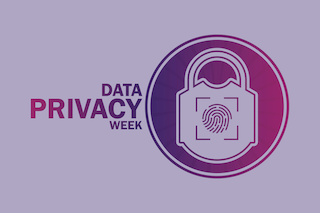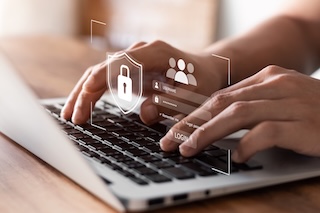Taking Control of Your Data is "Main Character Energy"
Your online activity creates a treasure trove of data. This data ranges from your interests and purchases to your online behaviors, and it is collected by websites, apps, devices, services, and companies all around the globe. This data can even include information about your physical self, like your health data – think about how an app on your phone might count how many steps you take.
You cannot control how each little piece of data about you and your family is collected. However, you still have a right to data privacy. You can help manage your data with a few repeatable behaviors. Your data is valuable, and you deserve to have a say!
Check out the resources below to learn how to manage your personal information better and help you make informed decisions about who receives your data.
About Data Privacy Week
The goal of Data Privacy Week is to spread awareness about online privacy. Data privacy should be a priority both for individuals and organizations. Our goal is twofold: we want to help the SF State community understand that they have the power to manage their data, and we also want to help all Gators understand why maintaining and regulating their data output is essential.
Why Is Data Privacy Important?
Your data is collected every day from multiple sources - your computer, smartphone, and any other internet-connected devices that you may use, which might even include your wristwatch or car! However, you often have some choices regarding how this data is collected, shared, and sold.
Once a source gathers your data, companies can store it indefinitely. Retailers can use your data to make inferences about your socioeconomic status, demographic information, and preferences. Businesses can even utilize seemingly innocuous information (food orders, retail orders, etc.) to make assumptions about you and your habits. Many companies can monitor the data of their users and consumers, and they sell the data for profit, often without your knowledge or consent.
If the thought of losing control over your personal data feels unsettling, don't worry! You have the power to take action. While you cannot completely shield all your data, such as credit card companies tracking purchases or the government holding your Social Security number, there are simple and effective steps you can take to manage your information. These actions empower you to take greater control over how you share your data and with whom.

Convenience vs. Privacy: Finding Your Sweet Spot
More often than not, when you download a new app, sign up for an online account, or join a social media platform, you're usually asked for access to your personal information before you can even use it! This data might include your geographic location, contacts, or even photos. For these businesses, your personal information is incredibly valuable. It's important to consider whether the service you receive in exchange for this information is worth it, even if it is free.
Here are a few questions to ask yourself to make more informed decisions about sharing your data with businesses or services:
- Is the service, app, or game worth the amount or type of personal data they want in return?
- Can you control your data privacy while still using the service?
- Is the requested data necessary for the app or service to function? For example, why would a Solitaire game need access to all your contacts?
- If you haven't used an app, service, or account in several months, is it worth keeping if you know it might collect and share your data?
Adjust Privacy Settings to Your Comfort Level
Check your privacy and security settings for every app, account, or device you use. These should be easy to find in the "settings" section and only take a few moments to change. Set them to your comfort level for personal information sharing; generally, it's wise to lean on sharing less data, not more.
You don't have to do this for every account at once; start small, and you'll habitually adjust all your settings to your comfort over time. We have provided a link to an in-depth, free resource like the Manage Your Privacy Settings page via the National Cybersecurity Alliance that lets you check the settings of social media accounts, retail stores, apps, and more.
Protecting Your Data is A Whole Vibe
Data privacy and data security go hand-in-hand. Along with managing your data privacy settings, follow some simple cybersecurity tips to keep it safe. The National Cybersecurity Alliance recommends following the Core 4:
- Create long and (at least 12 characters) unique passwords for each account and device. Use a password manager to store each password. Using a password manager makes maintaining dozens of passwords safely easier than ever.
- Turn on multi-factor authentication (MFA) wherever permitted – this keeps your data safe even if your password is compromised.
- Turn on automatic device, software, and browser updates, or install updates as soon as they are available.
- Learn how to identify phishing messages, which can look like emails, texts, or direct messages.

Thank you for taking precautions and vigilance when protecting your data here at SF State.
